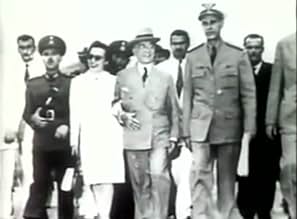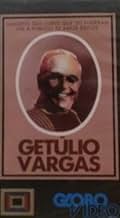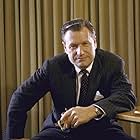Documentary on one of Brazil's most controversial personalities: Getúlio Vargas, an ex-president.Documentary on one of Brazil's most controversial personalities: Getúlio Vargas, an ex-president.Documentary on one of Brazil's most controversial personalities: Getúlio Vargas, an ex-president.
Photos
Eurico Gaspar Dutra
- Self
- (archive footage)
Benito Mussolini
- Self
- (archive footage)
Tancredo Neves
- Self
- (archive footage)
Nelson Rockefeller
- Self
- (archive footage)
Getúlio Vargas
- Self
- (archive footage)
- Director
- Writers
- All cast & crew
- Production, box office & more at IMDbPro
Storyline
Featured review
Ana Carolina's documentary is an interesting collage of audio and images from the newsreels era that follows one of the most controversial and also one of the most honored figures in Brazil history, president Getúlio Vargas (1882-1954). The film covers his two major political periods - which divides in between his power takeover (1930-1945) and the election period (1950-1954), which ended abruptly with his suicide on 24 August, 1954 after a scandal where a political rival was shot (but survived) and his bodyguard, a naval officer were killed by men allegedly under Vargas orders or coming from someone close to him - sadly, the film never touches this last important fact except for news clips.
The film, while good in just exposing rare and valuable images of a period where TV wasn't the main source of news, falters in not being sustainable when it comes to talk about historical facts, politics and even personal life of the man who defined a nation through almost 20 years, becoming the longest political leadership of Brazil. Always with some controversy, but he triumphed as being more than just president, dictator, opportunist and leader of the masses: he was the ultimate statesman, one of a kind that hardly ever lived and worked to achieve everything he wanted with his government in favor of the poor people (make no mistake, he also favored the riches as well, which explains how his first 15-year term wasn't so contested by any opposition except the communists, which he made sure to arrest or deport them all). Avoiding the presence of talking heads looking back to the past is a good thing (and I wonder why such idea was thought about, I mean Carlos Lacerda, Vargas rival, could expose his version of the facts of that day but there's a whole set of mystery about it), but you can't stop thinking that something was missing here. All we have is a narrator that pinpoints some remarkable feats by the man - in fact, the film is very pro-Vargas - but doesn't find ways to analyze with balance some of its problems, faults, sometimes just mentioning that his administration faced some economical crisis here and there.
Historians tend to confuse us with facts and information about Vargas period because it covers an extensive era, with plenty of acts and divisions - his first term was divided in three parts: provisional government between 1930-1934; the constitutional government going until 1937; and the following with the Estado Novo ("New State") until its ending in 1945 -so, I admired the few clarifying bits that made this film quite interesting. One thing I always knew was Getúlio's efforts during WWII sending our military personnel to Italy to fight the fascists; the Allies made military basis in the Northeast of Brazil to help UK forces with provisions, avoiding the Mediterranean routes; but what surprised me was that this involvement with the Allies almost failed halfway. It's a fact that Vargas remained neutral during the early years of the war and that he only changed his mind after Nazi U-boats attacked Brazilian ships in our own seashore. He followed the bigger group, fully supporting it but was very close of joining the Germans, thinking Hitler's regime was unstoppable, conquering many territories but not just that...Brazil's economy was in huge decline, and during a concerning speech U.S. involvement got heavier with FDR and Rockefeller visiting the country and more credit was given. But Getúlio doesn't escape blame for flirting with the Nazi since he approved sending the wife of his greatest rival Luis Carlos Prestes to die in a concentration camp in Germany.
And strangely enough for a pro-Vargas work, the creators fail to heighten many of his political/social/economical outstanding contributions in Brazil that last even today, such as the creation of laws establishing fair and wider relations between workers and employers; the ministry of labor which established and reinforced those laws, creating coverage, benefits and other things for all workers who didn't have almost any rights before that; an exemplary education system; massive exportation of our goods and products to other nations; a nationalization of many services and even an extreme control of foreign interference in our business (those were different times and he actually pulled this off quite easily); massive investment in oil companies, creating Petrobrás (now we're not so proud of it with scandal after scandal) which was an ignition to our economy expansion. He made a great deal of things, pushed us forward like no one ever did, and lately we're losing a great deal of his implements, specially the ones concerning labor laws. A 1974 film couldn't predict that but at least they should include all those facts I just posted so when people look back at his government and the days we face now or in the future, they'll say "he was one of our finest leaders".
Another reason why the film gets sidetracked is the excessive use of cultural background, old music from those days and some clips revolving the people, costumes and minor artistic moments that aren't given a proper context. There's far too many sequences like that while we keep waiting for the narrator to return or another speech from Vargas (he was a magnificent orator and a man of the people who enjoyed crowds but wasn't much of a cult of personality like his contemporary Stalin).
Good film, of important content and manageable to watch but still far from being the epic project Mr. Vargas needed and deserves. Its lack of reflections and critical thoughts about the man or the politician hurts the film (not blaming the director because the fingers of the 1970's current censorship/dictatorship might have a part on this). 6/10
The film, while good in just exposing rare and valuable images of a period where TV wasn't the main source of news, falters in not being sustainable when it comes to talk about historical facts, politics and even personal life of the man who defined a nation through almost 20 years, becoming the longest political leadership of Brazil. Always with some controversy, but he triumphed as being more than just president, dictator, opportunist and leader of the masses: he was the ultimate statesman, one of a kind that hardly ever lived and worked to achieve everything he wanted with his government in favor of the poor people (make no mistake, he also favored the riches as well, which explains how his first 15-year term wasn't so contested by any opposition except the communists, which he made sure to arrest or deport them all). Avoiding the presence of talking heads looking back to the past is a good thing (and I wonder why such idea was thought about, I mean Carlos Lacerda, Vargas rival, could expose his version of the facts of that day but there's a whole set of mystery about it), but you can't stop thinking that something was missing here. All we have is a narrator that pinpoints some remarkable feats by the man - in fact, the film is very pro-Vargas - but doesn't find ways to analyze with balance some of its problems, faults, sometimes just mentioning that his administration faced some economical crisis here and there.
Historians tend to confuse us with facts and information about Vargas period because it covers an extensive era, with plenty of acts and divisions - his first term was divided in three parts: provisional government between 1930-1934; the constitutional government going until 1937; and the following with the Estado Novo ("New State") until its ending in 1945 -so, I admired the few clarifying bits that made this film quite interesting. One thing I always knew was Getúlio's efforts during WWII sending our military personnel to Italy to fight the fascists; the Allies made military basis in the Northeast of Brazil to help UK forces with provisions, avoiding the Mediterranean routes; but what surprised me was that this involvement with the Allies almost failed halfway. It's a fact that Vargas remained neutral during the early years of the war and that he only changed his mind after Nazi U-boats attacked Brazilian ships in our own seashore. He followed the bigger group, fully supporting it but was very close of joining the Germans, thinking Hitler's regime was unstoppable, conquering many territories but not just that...Brazil's economy was in huge decline, and during a concerning speech U.S. involvement got heavier with FDR and Rockefeller visiting the country and more credit was given. But Getúlio doesn't escape blame for flirting with the Nazi since he approved sending the wife of his greatest rival Luis Carlos Prestes to die in a concentration camp in Germany.
And strangely enough for a pro-Vargas work, the creators fail to heighten many of his political/social/economical outstanding contributions in Brazil that last even today, such as the creation of laws establishing fair and wider relations between workers and employers; the ministry of labor which established and reinforced those laws, creating coverage, benefits and other things for all workers who didn't have almost any rights before that; an exemplary education system; massive exportation of our goods and products to other nations; a nationalization of many services and even an extreme control of foreign interference in our business (those were different times and he actually pulled this off quite easily); massive investment in oil companies, creating Petrobrás (now we're not so proud of it with scandal after scandal) which was an ignition to our economy expansion. He made a great deal of things, pushed us forward like no one ever did, and lately we're losing a great deal of his implements, specially the ones concerning labor laws. A 1974 film couldn't predict that but at least they should include all those facts I just posted so when people look back at his government and the days we face now or in the future, they'll say "he was one of our finest leaders".
Another reason why the film gets sidetracked is the excessive use of cultural background, old music from those days and some clips revolving the people, costumes and minor artistic moments that aren't given a proper context. There's far too many sequences like that while we keep waiting for the narrator to return or another speech from Vargas (he was a magnificent orator and a man of the people who enjoyed crowds but wasn't much of a cult of personality like his contemporary Stalin).
Good film, of important content and manageable to watch but still far from being the epic project Mr. Vargas needed and deserves. Its lack of reflections and critical thoughts about the man or the politician hurts the film (not blaming the director because the fingers of the 1970's current censorship/dictatorship might have a part on this). 6/10
- Rodrigo_Amaro
- Apr 27, 2017
- Permalink
Details
- Country of origin
- Language
- Production company
- See more company credits at IMDbPro
- Runtime1 hour 16 minutes
- Color
Contribute to this page
Suggest an edit or add missing content






